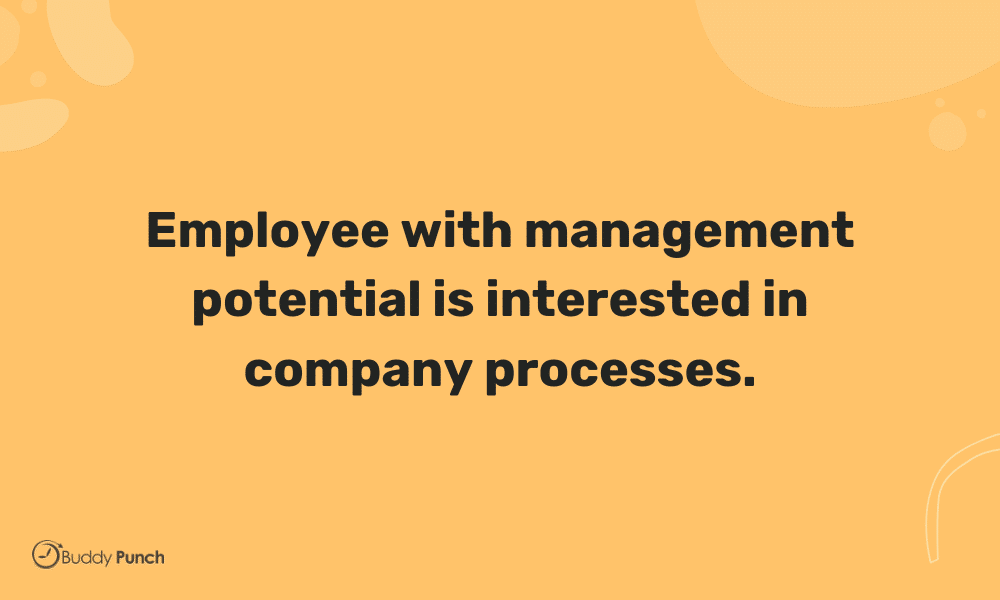13 Signs Your Employee is Ready to Become a Manager

One of the most satisfying parts of a manager’s job is finding the next superstar employee. If you’re lucky, you’ll spot their potential early and coach, mentor, and guide them into taking on more responsibility in your company.
So, what are the signs that you’ve got the next great manager on your hands? It’s not like workers come with a “Promote This Person” tattoo on their forehead, and employee promotion can quickly become tricky when you misread a person or they’re not quite equipped to take on a leadership role.
In this article, you’ll discover 13 things your team member might be doing to show you and other leaders that he or she is ready to reach a higher level in their career.
1. They’re Already Leading
There’s an old saying that “leaders aren’t born, they’re made.” While that is mostly true, some people show certain leadership qualities naturally.
Suppose an employee’s performance and behaviors inspire others to excellence in their own fields. Likely, that person is well on their way to becoming a new manager.
You can see it when coworkers naturally gravitate towards an employee, seek advice about work issues, and look to them when challenges arise to see their reaction.
However, perhaps the most significant behavior you see from natural leaders is that they go above and beyond in their own duties without you having to ask.
As a manager, you can trust this employee to:
- Put any feedback you give into action
- Anticipate your needs or the department’s needs and act
- Present you with solutions instead of problems
- Go out of his or her way to supply help and service to both internal and external customers
When employees consistently incorporate these actions, they can’t help but rise above the crowd and get noticed for their hard work.
But, instead of being the department suck-up, they are appreciated by their peers as someone genuine. In a way, even before they become a manager, they assume a natural leadership role among their peers. This employee wants the department—and the company—to succeed.
2. They Are Interested in the Company and Its Processes
An employee with management potential is always interested in the ins and outs of the company.
She wants to pick the brain of the loading dock guy for logistics theory as well as find out what the new IT manager is going to do to improve the functionality of the company website.
Encourage an employee like that to reach out to other departments for cross-training opportunities. At the very least, give them time out of your department to shadow coworkers and learn more about the business.
Such learning opportunities are significant because they allow the potential management candidate to expand their skills and knowledge of the company’s processes. It gives them the opportunity to get involved in new projects that will help them prepare for a more senior role.
At the very least, it helps the employee make new and stronger relationships with others throughout the company.
From an organizational standpoint, employees who want to work across departments like this provide flexibility and strength across teams for potential personnel issues down the line.
Encouraging collaboration between departments also helps end the dreaded “silo mentality” of withholding information from coworkers outside of one’s immediate circle that plagues many companies.
3. They Have the Bigger Picture in Mind
There are times when company leadership gets a little caught up in the company’s day-to-day running and fails to anticipate and identify future challenges to the organization.
So, if you have an employee who seems to be emailing you industry-based articles every week about current trends or wants to tweak the status quo, don’t get mad. Instead, celebrate the fact that you have a strategic thinker looking at the industry and the world around you.
See it at what it is: a sign of enthusiasm for the business and your company’s long-term well-being.
Today’s younger generation of workers is intensely interested in what the company does and what it stands for in the community. More than earlier generations, they want their work to mean something.
They are also willing to put in the effort that ensures they can achieve that within their company. That makes them an invaluable asset for determining company goals and objectives and not just daily operations.
They know that working hard to get into a management position will provide both personal and professional rewards for them, and the company will benefit from their knowledge.
4. They Aren’t Afraid to Take the Back Seat
Many people have worked with a micromanager.
Regardless of whether it was a coworker or a supervisor, it’s one of the most frustrating working relationships anyone has probably ever had.
Micromanagers cannot let go of work or projects completely, and the word “delegation” is foreign to them. They’re obsessed with the “how” work gets done, rather than the “why” it needs to get done.
Such managers feel like they’re the only person in the department that can get a job done right, so it’s easier for everyone if they do it themselves. This attitude destroys trust and makes others feel inadequate and unappreciated.
On the other hand, great managers are masters of delegation. They know the enormous benefits of trusting employees to get critical work done, and they’re not afraid to let them get credit for it. They know that when their staff shines, they shine as well.
Better yet, they can recognize when the best way to help others is to take a back seat. So if one of your employees demonstrates this ability on team projects, it is a great sign!
If an employee checks their ego, so others get acknowledged, it energizes the whole team.
Such a person knows that when work gets done effectively through teamwork, the organization benefits. This is someone that possesses one of the most important traits a manager needs.
5. They Value Learning
Sometimes the two elements of the term employee “training and development” are used interchangeably, but they aren’t quite the same. “Training” refers to a specific learning program that gives the employee a particular skill or knowledge that improves performance.
“Development,” on the other hand, involves a growth plan that supplies immediate skills and knowledge, but is much more expansive and geared towards the employee’s career path.
Employees ready to take the next step in their careers know that learning keeps their skills and knowledge relevant. That thirst for knowledge also makes them an asset to your organization that must be kept in-house.
Moving this employee into management shows that person and all his or her coworkers—that the company appreciates employees who value learning.
Having well-trained employees improves overall performance and productivity. Developing their skills isn’t a business cost, but an investment.
As the career guide Indeed.com points out, training programs “help prepare employees who are moving into higher roles and taking on more responsibilities in an organization. These programs will help them learn the skills that are required to function effectively in their new positions.”
Therefore, when an employee shows a desire and willingness to learn, it’s a great sign that they could eventually move into management.
Lifelong learning keeps this employee agile and adaptable when circumstances at work change.
They have the knowledge and skills to be flexible no matter what challenges get thrown their way, and they can adapt on the fly.
6. They Are Empathetic
Empathy, in this context, refers to the ability to understand and share another person’s feelings.
The Center for Creative Leadership recently stressed the importance of empathy in the workplace and the integral part it plays in leading others.
Empathy results in more effective interactions with people in general and more robust communication.
Empathetic employees, therefore, already have a head start on becoming good managers.
This is undoubtedly a trait you should look for in your candidate.
Dr. Shelley Thompkins from the Center points out that employees with empathy have a crucial component of emotional intelligence and leadership effectiveness. Many executives find emotional intelligence more desirable than technical skill when determining leadership positions in companies.
Harvard Business School reports that empathy and emotional intelligence account for nearly 90 percent of what sets high performers apart from peers with similar technical skills and knowledge.
But don’t worry.
Psychologists today believe that empathy is a skill like many others, and it can be learned. So, if your employee has strengths other than empathy, all is not lost.
Just make sure they get that training!
7. They Are Already Training Their Replacement
Wait, what?
Isn’t an employee taking time to train their replacement counter-intuitive and the quickest way to find themselves out of a job? Or at least a sure sign that they are ready to walk out the door?
That’s the farthest thing from the truth.
First, smart and self-aware employees who want to move up know that if they’re going to get that promotion, it’s best to have someone waiting in the wings ready to step into their role and provide a seamless transition.
Second, suppose the employee has a job essential to the daily running of the business.
In that case, the continuity he or she supplies by training a replacement shows that the employee thinks “big picture” and is ready to move up.
The ability to teach others effectively is a boon for any future manager’s skill set.
Many managers need to train their staff for certain parts of the job, whether it’s a new employee learning how to navigate complicated system files or an older worker adjusting to the new online performance review process.
Having a teaching skill is another feather in the future manager’s cap.
8. They Admit Their Errors
The only thing worse than someone trying to hide from their mistakes is a person who blames others for something they did.
Personal accountability is critical for every employee, but it is absolutely essential for managers. Managers and organizations that sincerely treat mistakes as learning opportunities come out ahead in nearly every way.
The American business magazine Inc. shared the four ways great leaders handle their mistakes, but it can apply to every employee.
According to them, when making a mistake, it is essential to:
- Acknowledge it
- Learn from it
- Teach others from it
- Move beyond it
As far as the employee potentially moving into a management role, he or she already knows that everyone watches how their manager reacts to everything for cues on how to feel.
So, if this employee utters those three powerful words, “I did it” without attempting to hide from it, they’ll have earned the respect and trust of those around them.
However, and this is important, any action your potential managerial candidate does or says after making a mistake must be sincere.
If the staff doesn’t believe that a certain employee is accountable as a peer, they’ll have a tough time accepting that it will happen when the individual is a manager.
Therefore, look for genuine accountability, and you will find a good candidate for management.
9. They Know When to Ask for Help
There are many reasons for someone to ask for help at work. The most obvious ones are a lack of experience with a particular task, being untrained, or merely wanting to know if there’s a better way to do something.
It’s not a sign of weakness to ask for help. Knowing how and when to ask is almost always appreciated by others. This is even more true when the person doing the asking is a manager.
Workers love seeing little signs that bosses are human from time to time.
On the other hand, what if it’s a coworker too embarrassed to ask for help? Or perhaps they procrastinated until the last minute because they didn’t want to look bad?
Even worse, they demand help “just because”?
Then maybe this isn’t the type of person you want in a position of leadership.
Here’s a little secret about people. They don’t expect anyone to know all and be all, so asking questions will strengthen bonds between coworkers most of the time.
This doesn’t apply in every situation. Constantly asking for assistance with something you should know how to do as part of your job is a red flag that you don’t care about it.
However, if an employee enthusiastically asks for help, implements what they’ve learned, and sincerely thanks the other person for their help, this willingness to learn and acknowledge other people’s efforts will someday make them a respected leader in the organization.
10. They Are Professional
Ask ten people their definition of what being a “professional” means, and you’ll probably get ten different answers.
For our purposes here, professionalism entails the following:
- Having honesty and integrity
- Being competent
- Always having accountability
- And yes, looking the part
So now think about that employee you’re considering for a promotion to manager.
Does he or she show all these qualities all the time? If not, why not? Furthermore, would you be comfortable with this employee representing your organization in public?
A supervisor or manager reflects your company culture for everyone.
It doesn’t matter if it’s a current employee seeking engagement and purpose, a talented job candidate trying to choose where he or she wants to work, or external customers trying to decide where to purchase from.
They make decisions based on the person they interact with and his or her behavior. This person becomes a role model for staff and a work partner for leadership.
Where professionalism is concerned, take your time to make the best decision you can, as it will reflect on all aspects of your company’s image.
11. They Know When to Challenge the Process
It’s funny how much stress stems from a change in the workplace, even when the change is positive.
Whether it’s the technology they employ in their work or the communication channels they use to share knowledge, employees get used to a certain way of operating, and shaking things up can throw them for a loop.
Leaders know that change, in general, is useful and often necessary, but convincing the team may be difficult.
That’s where the employees with leadership potential stand out.
Because they are on the front lines, they are often the first to know when a policy or a process isn’t working quite right.
And, because they’re natural go-getters, they go above being an individual contributor, often discussing the problems with coworkers who are directly affected by them to brainstorm solutions.
Finally, because they know how your business works inside out, they know when to approach you and intercede.
They do this not only to make you aware of the problem and how it impacts your employees but also to offer creative solutions about fixing it. This allows you to study the situation and discuss why it may or may not be workable with the employees.
Whatever the outcome, the important thing is that the discussion has begun — and it’s thanks to that exceptional employee.
12. They Are Good in a Crisis
The year 2020 and the COVID-19 pandemic have pushed the limits of crisis leadership for even the most veteran manager. Things couldn’t have been any more chaotic across all industries.
But, while this is undoubtedly an intense and unique time for management, it is perhaps even more trying for staff members.
However, it can give you insight into how well your employees handle a crisis.
For instance, are they asking if there is anything more they can do to help you and their teammates cope? Are they volunteering to do whatever it takes to help the organization?
Are they acknowledging how hard things are, but communicating supportive messages to their colleagues?
Real leaders are made during times of crisis.
You want the employee you’re thinking about promoting to acknowledge that coworkers are afraid, but nevertheless encourage resolve to get through.
This employee will help you give your staff direction and purpose while clarifying each person’s roles during the crisis.
He or she is another set of eyes and ears that helps you keep your finger on the team’s pulse of your team’s mental well-being but in a caring, positive way.
Perhaps more than anything else discussed in this article, seeing how they behave in a crisis can help you pick out your next great manager.
13. They Communicate Effectively
Have you sensed a common thread running through these 13 signs that an employee is ready to become a manager?
If you guessed communication skills, you’re right.
There is little doubt that the ability to connect with others to persuade, inform, and get their point across is essential for anyone’s success as a manager.
It doesn’t matter how brilliant or technically-savvy someone is, nobody works in a vacuum.
Every employee needs others to achieve success for themselves and the company.
Since you are already a manager, you know that when communicating, no two situations are alike.
In the span of a single morning, you may have to coach an employee having attitude issues with coworkers, attend a manager’s meeting with the CEO, and then talk to a vendor about why the parts you need to keep your truck fleet running ended up in New Jersey even though you’re in Indianapolis.
It’s the same for your employee.
They want to take on similar duties, so their communication skills need to be good, if not great, if you are to promote them.
You Won’t Find the Perfect Candidate – So Don’t Fret!
Even the best employees won’t check every box presented in this piece, so don’t let the lack of one or more signs keep you from promoting them.
Bottom line – a person can learn every one of these management skills with the right guidance and even improve the ones they already shine at.
Better yet, you can either be a mentor for your employee or find someone within your organization who would be a better fit to rise to the next level.
Promoting from within your company offers incredible benefits for your current employees. It makes your organization an attractive choice for outside talent, signaling long-term career development, and shows that hard work will eventually be rewarded with new roles.
With these tips, you’ll be able to reward your hard workers and increase employee engagement, and that is always a good thing.





